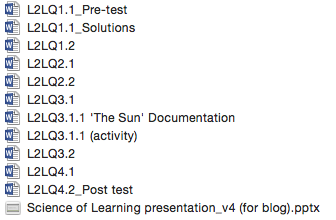Around the time that I was first getting really excited about Cognitive Load Theory and Desirable Difficulties, and shortly following my interview with John Sweller, I felt compelled to share much of what I had learnt with the senior maths staff at my school. The design brief (self-assigned) was essentially to work out a way to communicate the core of my learnings on these topics to staff in a way that 1. Applied the principles themselves, and 2. Could be fit into our already quite tight meeting time.
What resulted was the resources linked to a little further down. It was essentially 4 sessions that each took somewhere between 30 and 40 minutes to go through. I squeezed them into existing meetings which worked fine. Here's what was covered:
And here's all the resources shared via the link at the end of this post:

I originally called it ‘learning to learn', but ‘science of learning' is a better fit. I've changed it in the slides but haven't done so in the quizzes.
The sessions worked well and the team with whom I work found the sessions both engaging and stimulating. The content was essentially all entirely new to them and it put into context many of the practices (such as weekly quizzing) that I'd fostered in the senior maths department up till that point (for more on these initiatives, you can hear Craig Barton interview me about them here).
If I was going to change anything it would probably be to consider taking the marks off the quizzes. Additionally, I never got around to using the ‘Part 3: Create‘ activity in the post-test, but have left it in in for completeness.
Some teachers may be averse to the idea of being ‘quizzed' on what they've learnt, but the culture within my team allowed it. I'll leave other leaders to determine whether that's also the case for them, or whether these quizzes should be modified or replaced with something else that serves a similar function in their context. I could add that the premise is that this is first used with teachers, and then used with students (pending modifications if necessary). If it's communicated to teachers that this is the goal, that may make them more open to the ‘quiz' idea. Plus, by the time you get to the retrieval effect hopefully they'll understand the value of it anyway.
Please feel free to use as you see fit.
